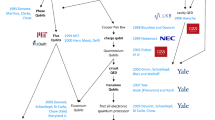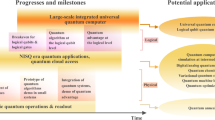Abstract
We show how a shared and programmable maximum-confidence discrimination (SPMCD) can be implemented by two remote parters Alice and Bob. Here Bob is given a qubit prepared in one of N linearly dependent symmetric equiprobable states. Alice has the knowledge of Bob’s signal states, but Bob has not. We build a quantum network that would be able to perform various desired maximum-confidence discrimination among Bob’s measured (data) states depending on Alice’s auxiliary (program) state. The SPMCD can be thought of as a two-step process, in which a two-outcome shared and programmable probability operator measure (POM) performed on data qubit B is firstly implemented by Alice and Bob followed by a N-outcome local POM on B implemented by Bob. We explicitly construct the required POMs. The fact that the nonlocal data-program conditional evolution, which induces the shared and programmable POM, can be realized deterministically using only two partially entangled qubit pairs is notable. The successful probability of implementing this SPMCD is optimal only for one program setting. However, for a relatively large set of program settings it can be very close to the optimal value in an ordinary, local, maximum-confidence discrimination. This protocol is feasible for current experimental technology.
Similar content being viewed by others
References
Cirac, J.I., Ekert, K., Huelga, S.F., et al.: Phys. Rev. A 59, 4249 (1999)
Neumark, M.A., Akad, I.: Izv. Akad. Nauk SSSR Ser. Mat. 4, 277 (1940)
Nielsen, A., Chuang, I.L.: Quantum Computation and Quantum Information. Cambridge University Press, Cambridge (2000)
Helstrom, C.M.: Quantum Detection and Estimation Theory. Academic Press, New York (1976)
Qiu, D., Li, L.: Phys. Rev. A 82, 032333 (2010)
Ivanovic, I.D.: Phys. Lett. A 123, 257 (1987)
Chefles, A.: Phys. Lett. A 239, 339 (1998)
Croke, S., Andersson, E., Barnett, S.M., et al.: Phys. Rev. Lett. 96, 070401 (2006)
Mosley, P.J., Croke, S., Walmsley, I.A., et al.: Phys. Rev. Lett. 97, 193601 (2006)
Jiménez, O., Solís-Prosser, M.A., Delgado, A., et al.: Phys. Rev. A 84, 062315 (2011)
Dušek, M., Buzek, V.: Phys. Rev. A 66, 022112 (2002)
Bergou, J.A., Hillery, M.: Phys. Rev. Lett. 94, 160501 (2005)
Hayashi, A., Horibe, M., Hashimoto, T.: Phys. Rev. A 72, 052306 (2005)
Hayashi, A., Horibe, M., Hashimoto, T.: Phys. Rev. A 73, 012328 (2006)
Bergou, J.A., Bužck, V., Feldman, E., et al.: Phys. Rev. A 73, 062334 (2006)
Chen, L.B., Lu, H.: Int. J. Theor. Phys. 52, 2335 (2013)
Chen, L.B., Lu, H.: Sci. Sin. Phys. Mech. Astron. 55, 55 (2012)
Ban, M., Kurokawa, K., Rei, M., et al.: Int. J. Theor. Phys. 36, 1269 (1997)
Gu, Y.J., Li, W.D., Guo, G.C.: Phys. Rev. A 73, 022321 (2006)
Bennett, C.H., Brassard, G., Crepéau, C., et al.: Phys. Rev. Lett. 70, 1895 (1993)
Jin, R.B., Chen, L.B., Wang, F.Q.: Chin. Phys. Lett. 24, 1799 (2007)
Huang, Y.F., Ren, X.F., Zhang, Y.S., et al.: Phys. Rev. Lett. 93, 240501 (2004)
Acknowledgments
This work is supported by the Natural Science Foundation of Guangdong Province, China (Grant No 06029431).
Author information
Authors and Affiliations
Corresponding author
Rights and permissions
About this article
Cite this article
Chen, L., Lu, H. A Shared and Programmable Maximum-Confident Discrimination among Linearly Dependent Symmetric Qubit States. Int J Theor Phys 54, 1948–1957 (2015). https://doi.org/10.1007/s10773-014-2399-8
Received:
Accepted:
Published:
Issue Date:
DOI: https://doi.org/10.1007/s10773-014-2399-8




